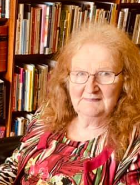The Bees, Canto 7 Poem by Sally Evans
The Bees, Canto 7
[towards end of canto seven]
.... The poet, as awareness grows
of Rice's friends, those of the human race,
has but two ways to deal with them: to have them climb Munros
or move them from the poem altogether.
They love to scramble to the tops of those
horse-shoes and ridges, checking clouds in hope of perfect weather,
take cars, book in at different small hotels
with names like Highland House or the White Heather,
and seek the paradise of rock and wide skyscape that tells
its secrets of a life above the burns
(which some call becks) and braes (which some call fells) .
They'll walk a few peaks in a day before the sun returns
behind the tops on its way round the seas,
magnifying the shadows of the ferns.
They're really happy up above the midges, roads and trees,
beyond the letters, calls and all the daily
unrelenting niggles of life, the breeze
so fresh. Then down they come for a romantic evening ceildh,
which even southerners can join, provided
they don't sing something naff like WIllow Wailey.
[end of Canto Seven]
.....this necessity of function.
Roz is behing Ros, as the two cars start
out from the Aberfeldy road at Ballinluig junction,
The main road's busy: there 's no gap this side.
Three stags step out, with a compelling unction,
on the grass verge. Three drivers mesmerised, two cars collide
into a heavy lorry: sides implode.
The occupants of both the cars have died.
The driver of the artic. lorry which has left the road
is slumped in the Pitlochry polis car
shaking like a leaf. He's shed his load.
The ambulances drive straight to the morgue. The queues stretch far
north, south and west. The road is closed for hours.
The polis have nightmares. The Rozzes are
heartlessly despatched, I fear. So are their friends and ours,
the scuptor and the poet, who paid more
than lip-service to art and all its powers.
Thus Rice, the master of the house, came down to the bees' door
and knocked to tell them somebody was dead.
That was when Tramp, who'd painted well before,
produced his masterpiece, the one that's known as 'Watershed.'
It's in a gallery in Inverness,
a bright riot of grey and white and red -
And what did the bees do? they understood, and mourned. They bless.
This poem has not been translated into any other language yet.
I would like to translate this poem